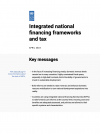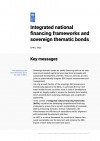Eight years since UN member states adopted the Addis Ababa Action Agenda to lay out a plan for financing the SDGs and halfway to the Agenda 2023 deadline, this year’s Financing for Development Forum offered the first opportunity for countries to report back to the UN’s Economic and Social Council on INFF progress.
Beyond the main forum session, different elements of INFF implementation were discussed across six events on topics ranging from sovereign SDG bonds to budget credibility. These events explored the broad range of reforms over 80 countries are driving forward through their INFF processes. They also provided space for dialogue between governments, private sector representatives, civil society and development partners.
Watch the events:
For a quick catch-up, we summarised five things we learned from this year’s forum.
1. The future of development finance is integrated.
A consistent theme across the forum’s discussions? Big-picture problems need cross-cutting solutions. 21st-century challenges and the era of poly-crisis call for integration across multiple dimensions. Integration of financing flows. Integration of national planning and finance. Integration of all dimensions of sustainable development into finance. Integration across development partner support. Integration of global, national and local. The list goes on.
Throughout the forum, we heard from countries and development partners who are thinking and working in new, integrated ways - many through INFF processes at the country level. These are not isolated examples. More than 85 countries are developing INFFs and establishing more inclusive and integrated systems, policies and reforms to finance sustainable development.
“Their unique selling point is that they can promote much greater financial coherence, mobilising and aligning finance with national development priorities and the SDGs,” reflected UNDP Administrator Achim Steiner at the forum’s plenary session on INFFs.
With national leadership and ownership, “The financing strategies at the heart of INFFs can bring together instruments and policies to mobilise and channel finance and investment to where they are most needed,” said Mr Navid Hanif, Assistant Secretary-General for UNDESA.
“We sought an INFF as an approach to improve the relationship between strategy and financing, between the Ministry of Economy and Finance,” said Luis Madera Sued, the Dominican Republic’s Vice Minister of Planning and Public Investment. “Our main motivation is to establish a fluid dialogue between those of us who think of development and those who work to finance it.”
The INFF process in Indonesia is helping the country make difficult decisions in a financially- and fiscally-constrained environment. “We are bringing together different stakeholders who previously worked in silos to play a more catalytic role in delivering integrated solutions,” said Raden Siliwanti, Senior Advisor to the Minister of National Development Planning. By creating a platform for greater cross-ministerial collaboration, the government can better understand and assess the risks and trade-offs associated with each policy option and outline the best course of action within its financing strategy.
This clarity is helping developing countries engage with development partners and global development processes more effectively. “A financing strategy is a sovereign piece of financial planning that provides governments with a stronger foundation for dialogue with the global international community,” said Marcos Neto, Director of UNDP’s Sustainable Finance Hub.
The role of INFFs in bridging global reforms with national processes is reflected in the UN Secretary General’s SDG Stimulus, which identifies INFFs as a holistic approach for aligning financial flows with development priorities and the SDGs at a national level.
2. Public finance is the backbone that can unlock finance for climate, jobs and social sectors.
In this time of enormous economic uncertainty, developing countries’ financing challenges were clearly outlined. So too, were the shortcomings of the global financial system. A significant proportion of investment continues to flow to the wrong things, remarked Mahmoud Mohieldin, UN Special Envoy on Financing the 2030 Agenda, at Egypt’s side event on greening national investment plans.
Speakers underscored the interconnectedness of the Global South’s most pressing issues - and the need for a paradigm shift in the role of government and private sector in accelerating a green and just transition. “We need to move away from viewing public goods as a cost,” explained Mia Seppo, ILO Assistant Director-General for Jobs and Social Protection, at the Global Accelerator on Jobs and Social Protection side event. “These are investments that actually serve the economy.”
There was broad agreement on the central role of public finance in driving investments that protect people and planet and build resilience to future shocks. While private finance is an essential piece of the puzzle, “the heavy lifting will be the responsibility of the state,” explained Mr Mohieldin. This will require holistic financing strategies translated into public budgets, a topic explored at length during the UNICEF and International Budget Partnership side event on budget credibility.
Maldives is spearheading an integrated approach through its INFF to align public and private finance with national development priorities, including its net zero target for 2030. In March, the Maldives launched its financing strategy, the first from a small island developing state and the first to link an INFF to Nationally Determined Contributions to the Paris Agreement. “We took the approach for the financing strategy that all finance should be treated as climate finance,” said Mariyam Muneer, Deputy Minister of Finance.
But where does this money come from? Beyond national budgets, we need to strengthen cooperation between governments, multilateral development banks and development partners to leverage global public funds to crowd in private finance. These relationships and the proposed reforms to the international financial architecture were discussed at length both during the forum and the World Bank-IMF Spring Meetings that preceded it.
3. Tax reforms come under focus as public resources are stretched even thinner.
Public resources remain the primary way governments can fund essential public services, protect the most vulnerable and achieve the SDGs. But tax levels remain inadequately low. How are governments rethinking their tax policies and systems to maximise the potential of domestic resources to drive sustainable development and realise more equitable societies?
At the Addis Tax Initiative side event, panellists discussed how governments are using INFFs to implement more effective tax systems. The panellists touched on a broad range of topics, including progressive taxation, digitalisation, minimum corporate tax, carbon tax, illicit financial flows, SDG-aligned procurement policies and tax incentives.
The main takeaway from the event: INFFs are helping countries to assess the aggregate effects of proposed tax reforms, looking at both public revenue and expenditure, and design a cohesive strategy for improved domestic resource mobilisation over a long-term horizon.
Significantly, public finance reforms are not considered in isolation within INFF processes. They are situated within a broader framework that considers all potential sources of finance. “Public finance reform is a part of larger economic reform, including the private sector. We cannot separate them,” said Yanuar Nugroho, Expert Coordinator at the National Secretariat of SDG Implementation in Indonesia.
The institutional structure overseeing Indonesia’s INFF process lends itself to holistic decision-making. It brings together all relevant actors (Ministry of National Development Planning, Ministry of Finance, Financial Services Authority, Ministry of Investment) to discuss public finance within the context of a broader financing strategy. “Without this type of framework, that kind of coordination will not happen,” explained Mr Nugroho.
Dr Sheka Bangura, Director of Policy and Research of Sierra Leone’s Ministry of Planning and Economic Development, echoed this sentiment at a side event held by the CSO FfD mechanism on INFF lessons and challenges. “We believe there is so much potential locally, domestically. The challenge is how do we unlock this potential?” said Dr Bangura. For Sierra Leone, the INFF process has created a platform for thinking about alternative ways to unlock domestic resources through multistakeholder dialogue that extends from the national to the subnational level.
4. Innovative financing instruments hold promise for mobilising private capital at scale.
“The potential for unlocking sustainable finance in Indonesia is enormous,” said Mr Nugroho at the Sida-Rwanda side event on SDG sovereign bonds. Indonesia has mobilised more than $7.8 billion through thematic bond issuances and is integrating its experience with innovative financing instruments into the INFF process. (Read more about Indonesia’s experience in UNDP’s latest brief on INFFs and sovereign thematic bonds.)
Private sector representatives at the forum agreed: interest in SDG-aligned investments is there. Yet, to significantly move the needle on SDG finance, we need to scale the incentives and instruments used to attract private finance beyond a few isolated examples.
To do this, investors pointed to three key areas: (1) de-risking private investment through the use of incentives, blended finance and guarantees; (2) creating clear linkages to SDGs targets with robust monitoring, verification and reporting; and (3) supporting roadmaps and strategies at the country level (through, for example, INFFs) to clearly outline financing needs.
Claver Gatete, UN Permanent Representative, explained how the INFF process in Rwanda is bringing together relevant stakeholders to improve evidence-based decision-making. “We are looking at where there are weaknesses, where there are gaps and then deciding how to fill those gaps together as a steering committee of government and development partners,” said Mr Gatete.
A key point reiterated throughout the event: country experiences with INFFs to date underscore the importance of planning. Countries are creating strategies that outline financing needs and project pipelines aligned with national priorities. They are anchoring these plans within debt sustainability considerations, making it easier for investors to come in and play an impactful role.
Anna Wallenstein, Regional Director of Sustainable Development in Latin America and the Caribbean at the World Bank, summarised this point: “Development results should be looking for financing solutions to make them happen, not the other way around.” We need to lead with country needs to ensure these innovative instruments are actually directing money to where it’s needed most.
5. Amplifying civil society voices in financing for development is more important than ever.
During the forum, civil society’s role within INFF processes, specifically, and financing for development, more broadly, came up repeatedly. “What people think is going on is super important. I don’t think we can underestimate the importance of politics and social acceptability,” said Ms Wallenstein at the Sida-Rwanda side event on SDG sovereign bonds.
At a side event held by the CSO Ffd Mechanism, representatives from civil society, governments and development partners discussed the potential risks and opportunities of INFF processes. The mechanism is working on four country case studies to explore these challenges and initiate a dialogue to ensure civil society concerns are adequality incorporated into INFFs at the country level.
Dr Bangura spoke about Sierra Leone’s INFF processes as a platform for inclusivity. “We are promoting a people's planning process. You can only get development right when you have people speaking to each other effectively,” said Dr Bangura. “You build cohesion among them through which you can energise them to undertake action.” The Government of Sierra Leone is using the INFF process as a way to embed multistakeholder dialogue within national and subnational planning and financing systems.
INFF processes are constantly evolving based on new lessons and insights - both in terms of country implementation and development partner support. The fact that INFFs are “living” processes is an invitation for civil society to play an active role, explained Shari Spiegel, Chief of Policy Analysis & Development for Financing for Sustainable Development at UNDESA.
As more countries develop and finalise their financing strategies, we are entering a key stage of INFF development. “This is the perfect time for feedback and discussion,” said Tom Beloe, Chief of Programme of UNDP’s Sustainable Finance Hub. “There is a lot of scope to work together with civil society to strengthen the financing strategies.”


